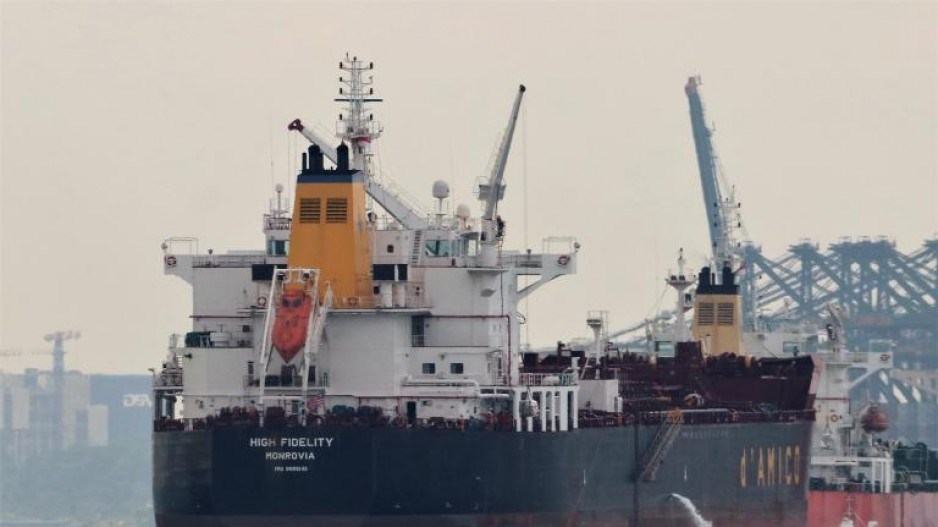When the Westridge Marine Terminal in Burnaby took delivery of jet fuel from China earlier in December, could it have been a violation of sanctions of Russian oil and petroleum products?
That’s the question David Huntley began asking when he recorded the arrival and departure of a fuel tanker delivering jet fuel from Jinshan, China last month.
Huntely, a retired Simon Fraser University professor who lives in Burnaby, has been recording tanker traffic coming in and out of Westridge Marine Terminal for a few years now.
In recent years, he has recorded a number of crude oil tankers leaving Vancouver for China, but has never recorded an import of jet fuel from China before.
On December 9, he recorded the arrival of the High Fidelity, an oil and fuel tanker. According to Vessel Finder, the tanker's departure point was Jinshan, China – a major chemical and oil refining district near Shanghai.
Huntley noted that it arrived with a draught of 9.8 metres and left with a draught of 8.4 metres.
“These indicate that it offloaded something,” Huntely said.
Trans Mountain Corp., which operates Westridge Marine Terminal, confirmed the High Fidelity delivered a load of jet fuel on December 9.
Deliveries of jet fuel in recent years have been erratic, Huntley said. In 2019 and 2020, he recorded 21 deliveries from South Korea, four from Japan, one from Taiwan and one from Hong Kong. But he has never recorded a jet fuel delivery from Mainland China before.
He suspects China’s increased access to cheap Russian oil means it can sell refined products at a lower cost now.
It’s no secret China has been buying more oil from Russia ever since the latter lost traditional markets in the West, as a result of its war in Ukraine and restrictions imposed on Russian oil.
Citing the Chinese General Administration of Customs, Reuters reported imports of Russian crude oil to China increased 9% from January to September 2022, and 22% in August.
At 64,255,223 metric tonnes, Russian oil imports into China over that period nearly matched imports from China’s next biggest supplier – Saudi Arabia.
“There is now a steady stream of crude oil tankers from Kozmino, Russia to China’s east coast,” Huntley said. “This all leads one to suspect that the Chinese are buying cheap oil from Russia, processing it into jet fuel, and we are buying it. If so, this should be a violation of the sanctions on Russian oil.”
Canada’s economic sanctions against Russia include prohibitions on Russian petroleum products. Jet fuel refined in Russia would be captured by the prohibitions.
According to Paul Pasco, an analyst for Kalibrate Global, there have been only three imports of Russian jet fuel to Canada since 2018 – the last one in February 2022, which is when Russia invaded Ukraine, triggering sanctions from a number of Western countries, including Canada.
Even if jet fuel recently imported from China was made from crude oil blends that included Russian crude, it probably is not captured by Canada’s sanctions, as per the Special Economic Measures (Russia) Regulations.
Those sanctions apply to oil and petroleum products directly produced in Russia, but do not appear to include petroleum products made from Russian crude but which was refined in other countries.
Trans Mountain said in an email that federal government agencies are responsible for ensuring imports are compliant with Canadian laws, including economic sanctions.
“Trans Mountain reviews the qualifications of all vessels nominated for shipments of oil to/from Westridge Marine Terminal. Appropriate Government of Canada agencies monitor compliance with Canadian laws and regulations, including sanctions such as those placed in Russia. For example, all vessels arriving in Canada are required to submit appropriate prior information to Transport Canada, and all imports have to be cleared by the Customs Border Protection.”




